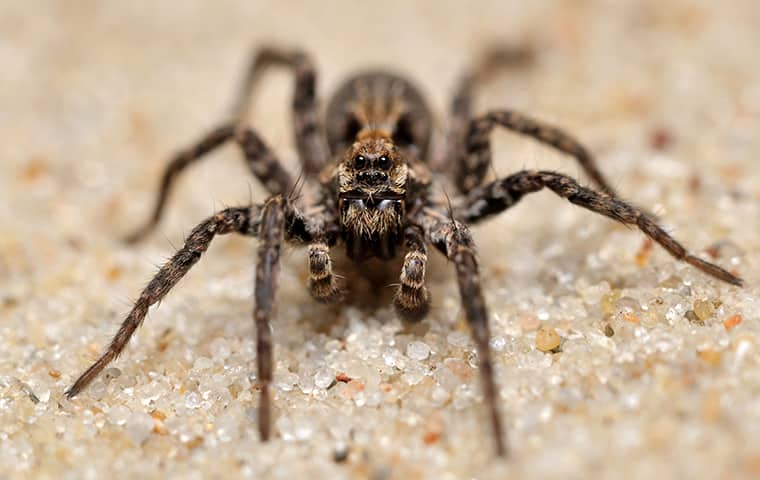Spiders cause fear and panic in people you would think are fearless. The same people that would run into a burning building to save a puppy shriek back in fear when a spider scurries across the floor. In some people, the fear of spiders can become a debilitating condition known as arachnophobia.
Having a fear of spiders is understandable and natural. When a quick, multi-legged, hairy creature runs toward you, a jolt of adrenaline hits your system and engages you in a fight or flight mode. If you see spiders in your Jacksonville home and find yourself in a constant battle or flight mode, then you need the Jacksonville pest control team from Trad’s Pest Control to come to the rescue. We will fight the spiders for you!
Wolf Spiders: Identification & Habits
A Florida spider that invades many Jacksonville houses is the wolf spider.
Worldwide, there are 2,300 wolf spider species, and about 200 are in the United States. Although there are variations between the various wolf spider species, these are typical characteristics:
- Body: The top of a wolf spider’s body is hairy, brown, dark grey, or black, and the underside of its body is pink or salmon.
- Length: Wolf spiders are half an inch to two inches in length.
- Markings: On the back of wolf spiders is a “Union Jack” pattern or stripes.
- Legs: Wolf spiders have eight legs with three tiny claws on each leg.
- Eyes: These spiders have eight eyes total, with two large eyes in the center row.
Unlike other spiders, wolf spiders in Florida do not construct webs; instead, they catch their prey by hunting them down. Most arachnids have poor eyesight, but wolf spiders have good vision enabling them to hunt at night. Because wolf spiders do not build webs to catch their prey, they usually live near walls along baseboards.
Common Ways Wolf Spiders Enter Houses
Wolf spiders hunt Florida bugs outside; however, during the winter months, when insects seek shelter, warmth, and food in Jacksonville homes, wolf spiders follow them into the house.
Wolf spiders enter homes through cracks and crevices in the foundation. Check locations where pipes and wiring enter the house for gaps. Wolf spiders are good climbers and can enter the home through holes in screened windows and doors. Outdoors, wolf spiders stay in firewood piles, under stones, and logs. Because they live in firewood piles, they sneak in when you bring in the firewood.
Like other bugs in Florida, light attracts wolf spiders. Illuminated exterior lights attract insects, and insects attract spiders. If bugs are not present, light still attracts wolf spiders to the house.
Four Expert Tactics On Dealing With Wolf Spiders
The best way to deal with wolf spiders is to take the following four preventative steps:
- Seal cracks, gaps, and crevices around the house.
- Limit outdoor light use at night or replace lighting with bug lights.
- Inspect firewood before bringing it into the home.
- Remove clutter in the basement and garage.
By removing hiding places and sealing access points in the home, you can reduce the wolf spider population in your house.
Total Spider Prevention Programs For Jacksonville Residents
The tips above will reduce the wolf spider population in your house, but they will not stop an infestation. To eradicate the spiders already in your home, you need to destroy existing spiders and their nests. To successfully end an infestation, you need professional pest control.
The wolf spider is one of many spiders of Florida that invade Jacksonville homes. Trad’s Pest Control has been stopping spider infestations since the 1970s. We have the tools, training, and experience necessary for effective treatments. Contact us and set up an inspection. We will identify the problematic spider species, develop a custom treatment strategy, and execute the plan to eliminate the wolf spiders in your house.

